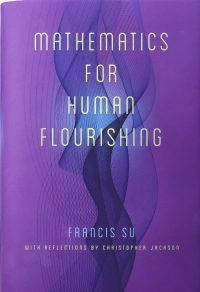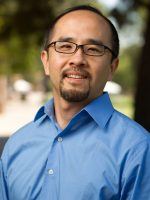by Jonathan Kujawa

As I’ve tried to convey over the years here at 3QD, mathematics is the bee’s knees. Like most apologias for mathematics, many of my essays tend to fall into one of two categories.
The extrinsic: on math’s usefulness in real-world applications like internet searches, GPS technology, compression and recovery of images, encryption, the handling of large data, and the like. This is the reason my relatives (and most of my students) think math is worth learning.
The intrinsic: on math’s beauty, universality, timelessness, ability to amaze and inspire awe, its endless depth and richness, and its ability to spark joy and fun. This is what drew me (and some of my students) to study math and still motivates me today to teach and do research.
But there is a third quality of mathematics which I’ve never quite been able to articulate. I’ve only managed to sneak up on it from time-to-time. This is the humanity of mathematics. For some, humanity may seem more the purview of literature, music, art, psychology, sociology, or philosophy. Not mathematics. They would be wrong, though.
In October, my 3QD essay gestured in this direction. I talked about how what is considered proven and important depends on human judgment [1]. I talked about the fact mathematics should be open to all, but is closed off to many; whether a person is encouraged or discouraged to follow their interest in math is a human and social affair, not a mathematical one.
But that essay, like my other efforts in this direction, wasn’t entirely satisfactory. It didn’t quite capture the full range of what could and should be said about the humanity of mathematics. Fortunately, Francis Su has managed to square this circle [2]. I just finished his truly exceptional book Mathematics for Human Flourishing. Dr. Su has said more than I could hope to about the deeply human aspects of mathematics.

The book is based on Dr. Su’s departing address as the outgoing president of the Mathematical Association of America. You can read the accompanying essay here: Mathematics for Human Flourishing. The book is an expansion of the essay, but this is not to say the book is the essay plus padding! The essay covered five themes, the book, twelve.
By going wider and deeper he is able to go to entirely new places. Dr. Su weaves together events from his own life, stories from his students and historical figures in mathematics and, most poignantly, letters from Christopher Jackson, a man who found his love of mathematics after receiving a thirty-two year prison sentence for crimes he committed as a teenager.
Dr. Su’s central thesis is that mathematics helps people flourish. What does he mean? As Dr. Su writes:
Human flourishing refers to a wholeness — of being and doing, of realizing one’s potential and helping others do the same, of acting with honor and treating others with dignity, of living with integrity even in challenging circumstances. It is not the same as happiness, and it is not just a state of mind. The well-lived life is a life of human flourishing.
To give a sense of the book, chapter titles include exploration, play, permanence, and truth. But also, meaning, struggle, freedom, community, and love. Dr. Su makes the compelling argument that all these are aspects of human flourishing and math communicates in deep ways with all of them. You might expect to see mathematics play a role in the first list, but it may be harder to imagine it as part of the second. Dr. Su makes the argument better than I could hope to, so I’ll let his words speak for themselves.
On Meaning:
Dr Su writes:
Likewise, mathematical ideas, too, are metaphors. Think about the number 7. To say anything interesting about 7, you have to place it in conversation with other things. To say that 7 is prime is talk about its relationship with its factors: those numbers that divide evenly into 7. To say 7 is 111 in binary notation is to have it dialogue with the number 2. To say that 7 is the number of days of the week is to make it converse with the calendar….
The meaning of words grows richer the more you use them — they have nuance, they evoke images — so that synonyms are not really synonyms. Poets find great delight in expressing an idea with just the right word. Mathematical ideas, too, grow richer in meaning the more you play with them….
Meaning is a fundamental human desire. We crave beautifully written poetry because we enjoy the richness of its meaning…. why do we settle for less in the way we learn mathematics?
On Power:
In discussing the ways in which mathematical knowledge and experience intertwine with power, Dr. Su reminds us this link may or may not be a force for good. We can use our power to uplift others by encouraging, explaining, and sharing, but we can also use it to do the opposite. Every parent who inadvertently transmits to their children their own anxieties and fear about mathematics is, perhaps unconsciously, using their power to close doors.
Even those of us who choose to tap into the power of mathematics must be mindful. As Dr. Su warns:
So you and I have a responsibility, as we grow in power, to use it for good — to grow in creative power and not coercive power. Creative power isn’t solely instrumental. You don’t grow in creative power only to accomplish things. You do it to be a better human being, to grow in virtue, to elevate human dignity — your own and those around you — in all mathematical spaces.

One freedom granted by knowledge, mathematical or otherwise, is the freedom given by knowing the options available to you. On this Dr. Su quotes a letter of Christopher Jackson who drew an analogy from chess:
It is [a sign] of a skilled chess player that he or she can play well out of any position or circumstance on the board. The person who is unaware of his or her options is like a player who is in a bad position. Because even if there are fruitful paths available to you that you are not aware of, they may as well not exist.
Related to this is the freedom granted by understanding. As Dr. Su describes it:
If you go through life pretending to understand, you will always be a slave to the things you don’t understand…. Math education should promote, rather than inhibit, this freedom, but as learners we must strive for deep understanding even when our education isn’t promoting it. This is where the hard work is.
I hope these morsels whet your appetite for Dr. Su’s remarkable book. If you read with an open mind and an open heart, it will transform how you look at mathematics and your fellow human beings. A similar book could be written about how poetry, music, or art can raise us up, and many have. But no small part of the thought-provoking power of Mathematics of Human Flourishing is the unexpectedly compelling way mathematics is shown to be just as important to our humanity.
By chance, a month or so ago I watched the documentary College Behind Bars. It speaks to the same themes as the Mathematics of Human Flourishing. It, too, made the compelling argument that every person is capable of greater depth and richness than we commonly give them credit for. People live their lives according to their choices and circumstances, but we shouldn’t be so quick to judge their potential.
As Dr. Su wrote:
Believe that you and every person in your life can flourish in mathematics.
[1] With the growing use of computer systems for verifying proofs, mathematical arguments can be mechanized and checked, but meaning and interpretation will depend on humans for the foreseeable future. As will the decision of which initial axioms and assumptions are allowed.
[2] Full disclosure: I’ve known Francis Su for years. Ever since he visited the University of Oklahoma to speak in our departmental colloquium and in our Math Day for high school students. He’s a great guy, but I’d recommend his book regardless!
[3] The original image is from here. It is a composite photo of a portion of the Milky Way. This one photo contains more than 84 million stars. The original image is zoomable and must be seen to be appreciated. Here at 3QD we saw every shuffled deck of cards is virtually certain to be the first of its kind. Dr. Su made a more cosmic comparison when discussing card shuffling.
